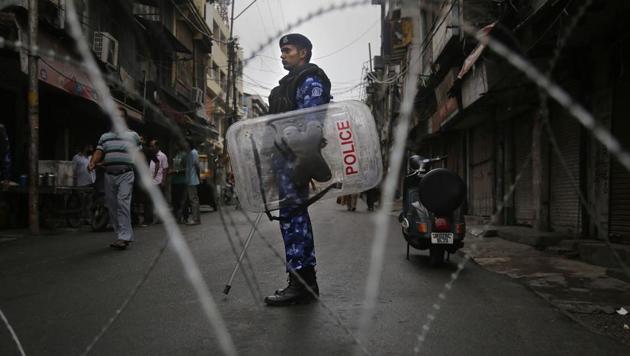Opinion | Article 370 fallout: Marginalisation of the Kashmiri mainstream
Having weakened pro-India politicians, haven’t you only ended up strengthening the extremists?
There can be varied opinions about Article 370 and Article 35A, and their actual value in Jammu and Kashmir. There is no doubt that 35A, for instance, needed, at the very least, an overhaul by the erstwhile state assembly to make it more equitable for women. Similarly, it is pretty indisputable that Article 370 has been hollowed out over the years, chipped away at, bit by bit, till only its skeletal frame was left hanging over the Kashmir Valley like the shadow of a promise from the past. And ironically, it is the Congress, not the Bharatiya Janata Party, that has been primarily responsible for this whittling away of 370.

At least 260 of the Indian Constitution’s articles were already applicable to Jammu and Kashmir, in a significant downgrading of powers to an Assembly that once had special legislative rights. In many ways, 370 was mostly a lingering symbol of ethno-nationalism — as was the state’s separate flag and constitution — rather than a substantive mechanism for peace-building and conflict resolution. The corollary is also true. If keeping the special status in place did not make things better on the ground in the Kashmir Valley, its abrupt removal is no guarantee of an improved situation. In fact, serious risk is written into the government decision.
The debate around the disruptive and dramatic decision by the Narendra Modi government is less about the special status going and more about the manner in which it was gotten rid of. Had it been preceded by an open debate in Parliament, before and not after the announcement, and a round of consultations with stakeholders — and had it not been accompanied by a clampdown of information and communication — the perception of forceful unilateralism may have been better addressed.
But there is one grave consequence of this week’s tumult, and that is the conclusive marginalisation of Kashmiri politicians who chose allegiance to the Indian Union. In fact, one of the reasons that protests have been muted in the Kashmir Valley so far could be because the separatists are hardly likely to take to the streets in support of a constitutional provision. On the flight back from Srinagar to Delhi, I met with a supporter of the pro-Pakistan Hurriyat Conference representative Syed Ali Shah Geelani. He argued that the last remaining fig leaf for mainstream Kashmiri politicians had now been stripped away. “Where will they hide now; what will they say?” he said.
And that may be the single biggest question to emerge from the debris of the collapse of Article 370. What happens to mainstream politicians in Kashmir? I say Kashmir because while the point is well-taken that the interests of Jammu and Ladakh have often been obscured by the domination of Kashmir, there is no escaping the fact that the problems of identity and insurgency are in the Kashmir Valley. So, when you lock up Omar Abdullah and Mehbooba Mufti, and even Sajad Lone and Imran Ansari, what is the signalling to political workers who have risked threats from militants and often paid with their lives, just to take part in the electoral process?
In his address to the nation, Narendra Modi spoke of how the stranglehold of dynastic politics and family fiefdoms in Jammu and Kashmir had prevented a new generation of leaders from rising. On that, he is right. Jammu and Kashmir has longed for a fresher political paradigm. But how will that be enabled by clamping down on those who have stood for India in the Valley? Shah Faesal, Indian Administrative Service topper-turned-neta told me that the “government wants to engineer a new set of mainstream politicians.”
But if you do not weaponise the existing individuals who have stood by the tricolour, and if you take away their legitimacy and authority, it can only discourage all those who contemplate a future for themselves within the Indian mainstream. In Srinagar, the administration insisted that the politicians were more than comfortable — Omar and Mehbooba, they said, were in Hari Niwas Palace, and Sajad Lone and Imran Ansari in Centaur hotel. On background, some officials even suggested that it suited the mainstream leaders to stay out of the public glare at this point. What will they possibly say if asked by people, these officials told me, explaining why the detention made complete sense even for the politicians.
But isn’t that the whole point? If elected representatives in Kashmir have to hide and duck the questions of their voters, because they have no good answers on what issues they will now fashion their politics from, it leaves Delhi with a piquant question.
What will the Kashmiri mainstream now stand for? And having so summarily weakened them; haven’t you only ended up strengthening the extremists?
Barkha Dutt is an award-winning journalist and author
The views expressed are personal






